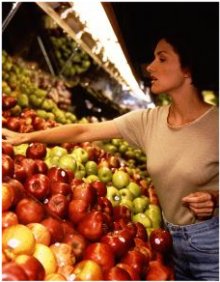15 February 2006
Bacteria Hysteria In The Supermarket
by Kate Melville
 Horror stories of harmful bacteria living on surfaces in public places are the bread-and-butter of scare-mongering television, but is there any scientific evidence to support the claim that these invisible microbes can do us serious harm? Well, yes and no.
Horror stories of harmful bacteria living on surfaces in public places are the bread-and-butter of scare-mongering television, but is there any scientific evidence to support the claim that these invisible microbes can do us serious harm? Well, yes and no.
According to a recent study, conducted by the Korean Consumer Protection Board, which examined the surfaces of a number of commonly used objects, shopping cart handles were found to have the largest colonies of bacteria. Yep, even more than that old stalwart, the public bathroom door handle. The study ran tests for bacterial content on six of the most frequently handled public items, and, as you might have guessed, the results appear suitably worrying.
Shopping cart handles are at the top of the report's scary-six list, with 1,100 colony-forming units of bacteria per 10 cm2, followed by the mice used in an Internet cafe, which had an average of 690 colony-forming units. Hand straps on buses are the next bacterial stronghold with 380 units, followed by bathroom door handles at 340. On the face of it, these results indicate that supermarket chains should distribute rubber gloves, respirators and disinfectant to any shoppers plucky enough to enter their premises, and Internet cafes - in the Chinese style - should be shut down immediately. But does the study really indicate a clear and present danger to public health?
In Australia, The New South Wales Food Authority believes that: "the risk of shopping equipment transmitting food-borne disease is minimal. However, microbiological organisms are present everywhere in our environment, including on our hands and clothes, and may be present on shopping equipment which appears otherwise clean." Hmm, well, I'm glad they clarified things for us.
In the face of bacteria hysteria, it's worth remembering that bacteria are everywhere, and we've been happily co-existing with them for millennia. And don't forget that regular doses of bacteria are believed to strengthen and prime our immune systems. Which mean that these latest findings shouldn't cause alarm, it's unlikely that you'll become a victim of the evil bacterial juggernaut.
And in any case, the Korean team responsible for the new report says that there is one sure-fire way to annihilate those possibly harmful bacteria picked up at the supermarket. After you have finished your shopping you need to mix CH3-(CH2)n-COONa with water and apply vigorously to the affected area (that's soap and water to you and me).
Source: Korean Consumer Protection Board
